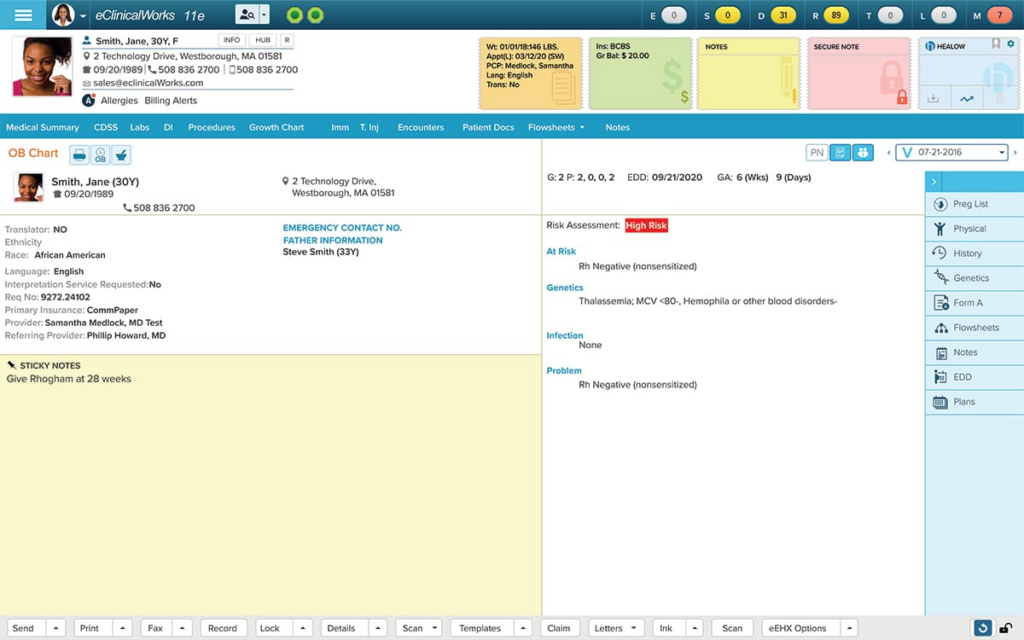By Mary Grlic
Healthcare is a critical infrastructure that is becoming more efficient by implementing the use of new technologies. Without the proper IT (information technology) management, medical providers and their patients may be put at risk. To stay in compliance with HIPAA guidelines, it is more important than ever to have a proper understanding of health information technology. In addition, your business can utilize tech to its advantage to maximize efficiency and improve service. Optimize your healthcare business with solutions like eClinicalWorks and Google Workspace.
HIPAA Compliance: How it Relates to Health IT
Any organization that deals with healthcare data in the United States must comply with HIPAA (Health Insurance Portability and Accountability Act of 1996) guidelines. The main goal of HIPAA is to improve efficiency in the medical field, make insurance more portable, protect patient information, and prevent data breaches. Although some technologies seem convenient, improper technological tactics may be harmful and fail to comply with regulations. This can put a healthcare facility and its patients at risk.

HIPAA compliance is when a medical facility puts in the proper management and controls for relevant patient health information (PHI). PHI may include medical history, demographic information, laboratory results, physician’s notes, and insurance information. ePHI specifically extends these data records to electronic PHI. Healthcare deals with a lot of this confidential information, holding data from every patient. Medical professionals record such information via written records or an electronic health record (EHR) system, both of which must be HIPAA compliant.
If your organization uses an EHR, it is important to note that there are several layers to maintaining HIPAA compliance with this system. Simply signing up for subscribing to an EHR system does not mean your organization will follow HIPAA regulations. Medical professionals must keep tabs on what is going on within such a system. That’s why good health information technology is important.
Modern Electronic Healthcare and Information Technology
There are some major rules within HIPAA that apply to electronic health records and information technology. First, any technology that stores PHI must sign off automatically after a certain time to prevent any unauthorized access. Users with access to health information must have strong login credentials. Patient health information must also be encrypted to prevent unauthorized access. Before using any online system, medical providers must check that their technology complies with these three regulations.

Medical organizations have multiple electronic records that they may use to better organize their patient data. As previously mentioned, an electronic health record (EHR) includes extensive records of an individual’s health data over time. They are often stored in a cloud for easy access. Personal health records (PHRs) can be controlled by patients and are very similar to EHRs. Medical professionals may also use e-prescribing to fill out prescriptions via electronic device rather than a physical script. Again, these files will be much easier to access and utilize for the patient.
The switch of such information to electronic devices streamlines medical processes. Electronic recording is much easier for most doctors and can improve accuracy. It is also easier to share files or medical documents to patients and other healthcare workers. There is less paperwork, which will again increase efficiency for many medical practices. Doctors can also easily understand and follow up on their patients as the records are very accessible. It is also important to recognize the risks to electronic healthcare.
Electronic Threats to a Healthcare System – What to Watch Out for
Managed medical professionals must be aware of the risks associated with storing PHI or other medical data using technology. When it comes to health technology, uptime is critical. Any threat to system access or reliability is a major concern. Systems must be monitored regularly (ideally 24/7) so that any issues that arise on a device could be fixed beforehand. If a server experiences any downtime in a healthcare facility, they could run the risk of not being able to properly give patients immediate care or attention. With good IT administrators or a reliable managed IT service provider, any healthcare organization can be sure that there will be very minimal downtime.
Data Corruption and HIPAA Compliance
Data corruption can happen in any industry. Any unauthorized access of PHI is a major liability for healthcare professionals. Ransomware is huge threat to medical professionals — it can override systems and deploy malicious software onto computers. This not only makes them more difficult to navigate but may corrupt private patient data. Unfortunately, ransomware is becoming an increasingly overwhelming issue, with the amount of attacks almost doubling in 2021 as compared with 2020. A lot is on the line for the healthcare sector.

Without compliance of HIPAA, medical providers will face major risks of losing their business. As there is so much confidential data on the line, healthcare facilities must understand and fully comply with the ways to protect that information. False security can lead to malpractice lawsuits, termination of businesses, and more unfortunate consequences for any doctor. It is the responsibility of medical professionals to protect any data they hold in order to keep patients and the business safe. This is one of the most important parts of health information technology.
Importance of Data Backups and Recovery
If a natural disaster hits how can a medical organization continue to operate? When a server goes down, how do hospitals work to maintain their uptime? Especially with so much ePHI in an office, these unfortunate events can cost a lot for medical organizations.
Proper data management is crucial in any field or environment, but it is even more important when officials are dealing with patient health information. Any stored data is necessary for the upkeep and maintenance of a patient’s life. Not only would a data breach or loss of data endanger the practice, but patients will also be at risk. There is an added layer of compliance with data recovery for healthcare organizations to follow due to HIPAA regulations.
If a healthcare facility, or any organization for that matter, needs to create a recovery file of their stored data, they should follow the 3-2-1 rule for data storage. The organization should keep at least three copies of data, store this data on at least two different forms of media, and keep one backup in a location offsite. This comprehensive backup method is the most successful and reliable way to ensure that all information is properly saved. However, medical offices should be cautious when choosing their second storage data site. Unfortunately, if the backup is in a physical location, it runs the risk of a natural disaster. A cloud-based saving source may be a good complement to a physical drive to protect health information.
Cloud-Based Storage
For organizations that cannot manage the data backup and recovery process on their own, it may be useful to implement some cloud-based saving tactics. Within healthcare organizations, IT departments may have to manage all of the technological devices, such as MRI machines or radiology PACS. It is simply not possible to have these same technicians oversee the rest of the IT department, so having an outside organization manage IT needs may be a great solution. Cloud based systems, like Google Workspace and eClinicalWorks, are essential in the event of an emergency for speedy data recovery.
Google Workspace and eClinicalWorks – Optimize your Medical Practice


Managed cloud solutions can make work in a medical office much easier. Google Workspace (previously known as G Suite) is Google’s cloud solution for healthcare organizations to enhance productivity and efficiency. There are so many advantages like cost savings, HIPAA compliance, and advanced cybersecurity. Google Workspace may be a great option to streamline your healthcare organization. eClinicalWorks is another cloud-based health software that offers many systems to benefit medical organizations. With great solutions for population health, patient engagement, and revenue cycle management, eClinicalWorks is one of the leading medical services that works to improve healthcare for its customers. Many healthcare services use eClinicalWorks to help with efficiency within the business and stay cyber safe through their cloud system. Overall, eClinicalWorks could be a great solution for anyone in the healthcare industry.

Protecting and Optimizing your Healthcare Organization
Implementing electronic or technological systems within a medical organization can increase productivity, but requires constant monitoring. Good health information technology is critical for a medical organization. If a facility does not use technology that complies with HIPAA regulations, they can put their business and patients at danger. An organization may experience a malpractice lawsuit or other consequences for failure to regulate in compliance with HIPAA. With the proper use of IT systems, medical offices can increase their productivity, make data more accessible, decrease their medical-related errors, optimize costs, and improve staffing, among other things. Incorporating a good program like Google Workspace or eClinicalWorks can help your business maximize efficiency and stay on track.
Overall, a good healthcare IT protection program is a game changer for any medical organization. Computero may be the perfect helper to prioritize your organization’s information technology needs. As a managed IT service provider, our support experts are here to help you implement cloud-based solutions like Google Workspace and eClinicalWorks. Contact us today to learn more about how Computero can assist your healthcare organization with managed IT services.





0 Comments